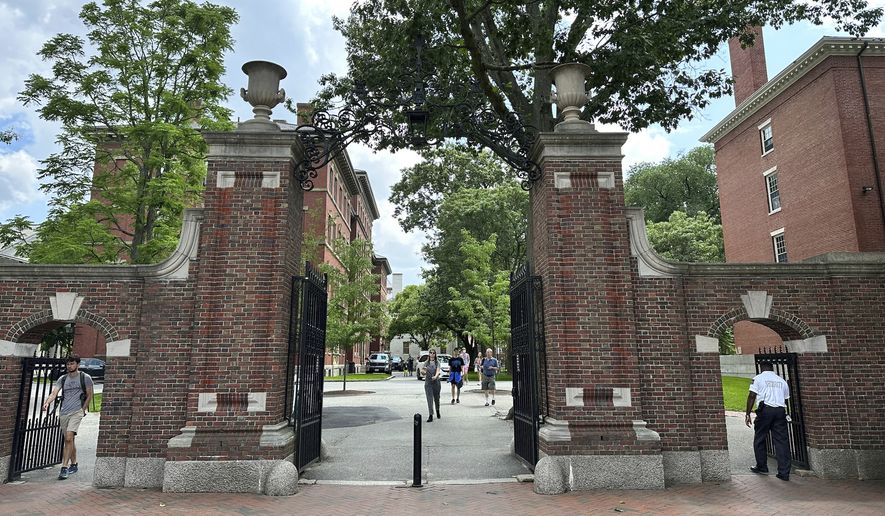American colleges are eagerly awaiting the outcome of a U.S. Education Department investigation into Harvard University’s admissions policy for “legacy” students, wondering whether the time has come to eliminate a policy that seems to chiefly benefit White applicants.
Legacy admissions, or special preferences to students with relatives who attended the school, have come under fire since the Supreme Court ruled in June that race-based affirmative action programs violate the Constitution.
Supporters and opponents of affirmative action say it’s time to end legacy admissions.
“It is a puzzle why Harvard and dozens of other elite schools continue to give preferences for legacy applicants,” said Edward Blum, president of Students for Fair Admissions, which brought the affirmative action cases to the Supreme Court.
Plenty of other schools have come to the same conclusion.
Wesleyan University in Connecticut and Occidental College in California ended legacy preferences last month. They said they wanted to remove “any potential barriers to access and opportunity.”
Both schools insisted that legacy status never played much of a role in their decision-making.
Not so for Harvard. College Transitions, a firm that helps students with school admissions, said the admission rate for legacies at Harvard is five times that of non-legacies.
Supreme Court Justice Neil M. Gorsuch, in an opinion siding with the majority against Harvard’s race-based policy, said the school could create a diverse environment by eliminating the use of legacy and donor preferences.
In some ways, though, Harvard may be a holdout.
Andrew Belasco, CEO of College Transitions, said legacy admission was a “significant advantage” at many schools as recently as five years ago. As acceptance rates plummet, he said, the balance is shifting and legacy status has been reduced to something like a tie-breaker.
“There is definitely a trend of schools doing away with legacy admissions, and the Supreme Court case has served as an accelerant,” Mr. Belasco said. “I would expect more prominent schools to follow in the coming year.”
The Education Department started investigating after Lawyers for Civil Rights, representing several racial and ethnic groups, filed a civil rights complaint. The Civil Rights Act of 1964 bars racial discrimination in entities that receive significant federal funding. The complaint says Harvard’s legacy policy is a hurdle for minorities in the admission process.
The Education Department confirmed publicly that it had opened the investigation but revealed little else.
Harvard didn’t respond to an inquiry for this report. The school declined to comment when the complaint was filed.
Harvard previously defended legacy admissions as a way to keep alumni “engaged.” It also goes hand in hand with another policy that gives a leg up to children of financial donors.
“Although alumni support Harvard for many reasons, the committee is concerned that eliminating any consideration of whether an applicant’s parent attended Harvard or Radcliffe would diminish this vital sense of engagement and support,” the school said in a private study, which became public during the court challenge to its affirmative action program. Radcliffe is part of Harvard.
John Agresto, a former president of St. John’s College in Santa Fe, New Mexico, and author of “The Death of Learning: How American Education Has Failed Our Students and What to Do About It,” said ending racial preferences is the right move, but schools — particularly private institutions — should be able to rely on some non-merit yardsticks.
“Some may want to have stellar sports teams; some may want to keep up family traditions and honor alumni and their children; some (like HBCUs) may for justifiable reasons wish to recruit primarily within the Black community; some may wish to serve only women, or Catholics, or Iowans, or some group that they have historically served,” he said in an email to The Times.
“Private colleges should be given openness to fashion their character as best they see fit,” said Mr. Agresto, now a board member at the Jack Miller Center. “We talk ever so much about diversity these days, but eroding the distinctive character of our varied schools and colleges — so long as their distinctions are not covers for racial selectivity — potentially does more to harm the true and valued diversity of our colleges and universities than we should tolerate.”
A study at the Massachusetts Institute of Technology concluded that giving preference to relatives of alumni makes good financial sense. MIT is Harvard’s neighbor and a highly selective school that does not use legacy admissions.
Legacy applicants are more likely to accept offers of admission and are less likely to take financial aid, the study said. Legacies who graduate are more likely than non-legacies to donate to their alma mater.
The study, which looked at 16 years of data from top schools, said legacies generally weren’t “significantly more qualified” than other applicants but tended to be White.
Whether that’s enough to persuade the Education Department to declare legacy preferences illegal at Harvard remains to be seen.
“It is the belief of most legal observers that legacy preferences are not illegal,” Mr. Blum told The Times. “If they were, it is likely the NAACP or other racial advocacy groups would have initiated litigation years ago.”
Mr. Belasco said he expects the department to rule against Harvard.
“At a school like Harvard, legacy policies likely reduce the number of comparable (or more academically qualified) students of different ethnicities as well as students from lower-to-income families,” he wrote in an email.
• Alex Swoyer contributed to this report.
• Stephen Dinan can be reached at sdinan@washingtontimes.com.




Please read our comment policy before commenting.